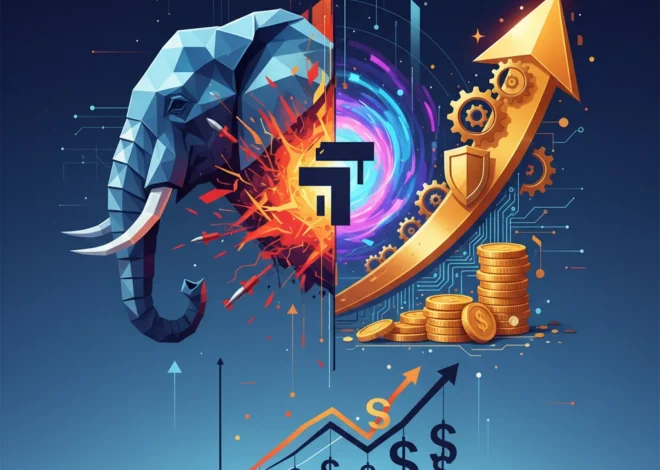
The Empty Chair: What the US G20 Boycott Means for the Global Economy and Your Portfolio
In the world of international diplomacy, an empty chair often speaks louder than any speech. The recent G20 summit in South Africa concluded not with a bang, but with the quiet resonance of a notable absence. While South African President Cyril Ramaphosa spoke of a “renewed commitment to multilateral co-operation,” the boycott of the summit by the United States casts a long shadow over that sentiment. This was not merely a diplomatic scheduling conflict; it was a potent symbol of the shifting tectonic plates of the global economic and political order.
For investors, finance professionals, and business leaders, ignoring such a signal would be a critical error. This event is a microcosm of a broader trend: the fragmentation of the post-Cold War global consensus and the rise of a multi-polar world. Understanding the implications of this shift is no longer an academic exercise—it is essential for navigating the future of finance, investing, and international business.
The G20 at a Crossroads: From Global Cooperation to Geopolitical Competition
The Group of Twenty (G20) has long been hailed as the premier forum for international economic cooperation. Comprising 19 of the world’s largest economies plus the European Union and the African Union, it represents around 85% of global GDP and 75% of international trade. Its primary function has been to steer the global economy through crises, from the 2008 financial meltdown to the recent pandemic, by coordinating fiscal and monetary policy.
However, the spirit of cooperation that once defined the G20 is visibly fraying. The US decision to boycott the South African summit underscores deep-seated geopolitical fissures. While official reasons often remain veiled in diplomatic language, analysts point to a confluence of factors, including differing stances on the Russia-Ukraine conflict and the West’s growing concern over China’s expanding influence across Africa and the “Global South.” The symbolism of the US, the traditional anchor of the global financial system, stepping away from a G20 meeting hosted by a key member of the competing BRICS bloc is impossible to overstate.
This fractures the very foundation of the G20’s effectiveness. When the world’s largest economy chooses absence over engagement, it paralyzes the group’s ability to forge consensus on critical issues like debt relief for developing nations, global banking regulations, and coordinated responses to inflation. The “renewed commitment” President Ramaphosa mentioned may be the aspiration, but the reality on the ground is one of deepening division.
A Tale of Two Blocs: The G20 vs. an Expanded BRICS
The US absence from the G20 summit in South Africa is particularly significant given the host nation’s role in the BRICS+ group—a coalition increasingly positioning itself as an alternative to Western-led institutions. Originally comprising Brazil, Russia, India, China, and South Africa, the bloc has recently expanded to include major energy and regional powers, fundamentally altering its economic weight. This creates a clear counter-narrative to the G20’s vision of a single, integrated global economy.
To understand the shifting balance of power, it’s helpful to compare these two economic heavyweights. The following table provides a snapshot of their relative scale, highlighting why the rise of BRICS+ is a development that financial markets can no longer ignore.
| Metric | G20 | BRICS+ (Expanded) |
|---|---|---|
| Share of Global GDP (PPP) | ~85% | ~36% (source) |
| Share of Global Population | ~66% | ~45% |
| Share of Global Oil Production | Varies by member | ~44% (source) |
| Key Economic Focus | Global financial stability, policy coordination, trade liberalization. | Development finance, de-dollarization, infrastructure investment (New Development Bank). |
| Dominant Influences | United States, European Union, Japan. | China, Russia, India. |
As the table illustrates, while the G20 remains the dominant economic force, the expanded BRICS+ is a formidable entity, particularly in terms of population and control over key commodities. This growing influence challenges the long-standing architecture of global finance.
Market Volatility and Portfolio Strategy in a Fractured World
For those involved in the stock market, trading, and investing, geopolitical tremors like this are no longer background noise—they are primary risk factors. A fragmented global order introduces several layers of uncertainty and volatility that must be priced into any investment thesis.
1. Heightened Geopolitical Risk Premium: A world of competing blocs is a world of increased friction. This can manifest as trade disputes, sanctions, resource nationalism, and even military conflict. Markets detest uncertainty, and as cooperation wanes, the risk premium on assets will rise, potentially depressing valuations and increasing volatility.
2. Currency and Supply Chain Disruptions: The cohesion of the G20 helped stabilize currency markets and smooth global supply chains. As nations align into separate economic orbits, we can expect greater currency fluctuations. Furthermore, businesses will be forced to re-evaluate their supply chains, moving from “just-in-time” to “just-in-case” models that prioritize geopolitical stability over pure cost efficiency. This de-globalization trend has inherent inflationary pressures, a key factor for any economic forecast.
3. Divergent Regulatory Environments: A major, unheralded success of the G20 was fostering regulatory convergence, particularly in banking and finance after 2008. A split world could lead to divergent rules on everything from capital requirements to data privacy and the regulation of financial technology (fintech). For multinational corporations, this creates a complex and costly compliance web that could stifle innovation and cross-border investment.
The Future of Banking and Fintech: A New Digital Iron Curtain?
The implications of this new geopolitical reality extend deep into the plumbing of the financial system. The rise of a powerful, non-Western bloc accelerates the search for alternatives to the dollar-dominated infrastructure that has underpinned global commerce for over 70 years.
This is where fintech and blockchain technology enter the picture not just as tools of efficiency, but as instruments of geopolitical power. The BRICS nations, led by China, are aggressively exploring and implementing Central Bank Digital Currencies (CBDCs). According to the Atlantic Council’s CBDC tracker, over 130 countries are now exploring a digital currency, representing 98% of the global economy (source). A shared CBDC platform or interoperability protocol among a bloc of nations could create a parallel payment system, enabling trade and investment flows outside the purview of the SWIFT network and the US dollar. This would represent the most significant change to the international banking system in a generation.
This “splinternet” of finance could force businesses and investors to operate within walled digital gardens, navigating different payment rails, data standards, and technological protocols depending on the geopolitical alignment of the market.
Actionable Takeaways for Leaders and Investors
Navigating this complex new environment requires a shift in mindset from reacting to headlines to proactively building resilience.
- For Investors: Geopolitical diversification is now as crucial as asset class diversification. Re-evaluate your portfolio’s exposure to specific currency blocs and political risks. While emerging markets in the BRICS+ orbit offer growth potential, they also carry higher volatility and regulatory risk. Consider hedging strategies that account for sharp currency movements and supply chain shocks.
- For Business Leaders: The era of frictionless globalization is over. It is imperative to map and stress-test your supply chains for geopolitical vulnerabilities. Diversify your manufacturing bases and supplier relationships to avoid over-reliance on any single country or political bloc. Invest in sophisticated treasury management to handle increased currency risk and explore new financial technology solutions that can navigate a more complex payments landscape.
- For Finance Professionals: The field of economics is becoming inseparable from geopolitics. Understanding the strategic objectives of different economic blocs is now critical for accurate forecasting and risk management. Stay abreast of developments in CBDCs and cross-border payment systems, as these will define the future of international banking and trading.
The Billion-Pound Problem on Your Plate: Why a Waiter Shortage Should Worry Investors
Conclusion: The End of One Chapter, The Start of Another
The empty US chair at the G20 summit in South Africa was not an isolated incident. It was a clear signal that the established rules of global economic governance are being rewritten. President Ramaphosa’s call for multilateralism, while noble, rings hollow in a world that is actively de-coupling into competing spheres of influence.
This new era will be defined by complexity, volatility, and competition. It will challenge long-held assumptions about the U.S. dollar, global trade, and international cooperation. For those in finance, business, and investing, success will no longer depend on simply understanding markets, but on understanding the intricate, and often unpredictable, interplay of power and economics on a global stage. The message from Pretoria is clear: the world is changing, and our strategies must change with it.


